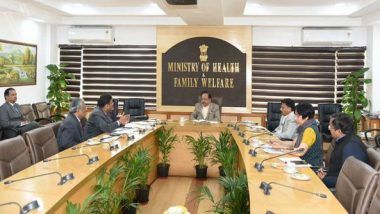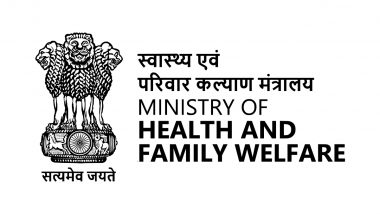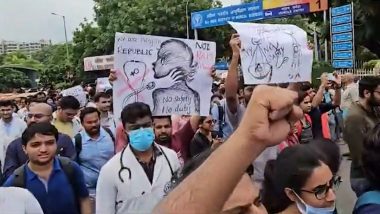New Delhi, June 27: To bolster COVID-19 management efforts in the national capital, the Indian Council of Medical Research (ICMR) has supplied diagnostic material for carrying out 4.7 lakh RT-PCR tests to the 12 functional labs in Delhi till date, the Union Health Ministry said.
It has provided 1.57 lakh RNA extraction kits essential for carrying out tests and 2.84 lakh VTMs (Viral Transport Medium) used for collecting and transporting swabs to laboratories. Besides, a 1,000-bed full-fledged hospital for COVID-19 patients in Delhi, developed by DRDO and to be manned by doctors and paramedical staff from the Army would be functional next week from an area near Dhaula Kuan, the ministry said. India’s COVID-19 Count Crosses 5 Lakh-Mark With Highest Spike of 18,552 New Cases in Past 24 Hours, Death Toll Mounts to 15,685.
This new hospital would have a referral relationship with AIIMS, New Delhi and the facility would be equipped with oxygen, ventilators as well as an ICU, the ministry said in its statement. A 2,000-bed Sardar Patel COVID Care Centre and Hospital at Radha Soami Satsang Beas in Chhatarpur here has been made operational.
The facility, which will have 10,000 beds, will function as an isolation centre for mild and symptomatic coronavirus patients. The entire operation of this Centre, including ensuring availability of requisite numbers of medical personnel, has been entrusted to the Central Armed Police Forces (CAPFs), with Indo-Tibetan Border Police (ITBP) taking the lead in this process.
In view of the sudden surge in coronavirus infections, the apex health research body ICMR has approved antigen-based rapid tests and supplied 50,000 such kits to Delhi government free-of-cost for supporting COVID-19 containment efforts, the statement said.
The National Centre for Disease Control (NCDC), under Ministry of Health has supported the efforts of Delhi Government through technical guidance on all aspects of COVID-19 surveillance and response strategy, the ministry said.
The areas include identification and assessment of quarantine facilities and COVID Care Centres (CCC) in the beginning of epidemic, orientation training and technical support on surveillance, contact tracing and lab aspects including infection prevention and control, data analysis and timely feedback to the Delhi government on the gaps identified and suggested solutions. Coronavirus in India: Recovery Rate Improves to 57.43%; Death/Lakh Stands at 1.06 As Compared to 6.24 in The World.
The NCDC has also provided laboratory diagnostic support for processing of samples by RT-PCR including training of lab professionals of the Delhi government, the ministry said. Technical support by NCDC included deployment of multiple central teams of experts for situational analysis and subsequent recommendations accordingly, and deployment of public health experts to coordinate.
The central agency also provided technical inputs to district level teams in implementation of revised Delhi COVID Response Plan and planning and execution of sero-prevalence study on coronavirus infection in the city. The Revised Delhi COVID Response Plan has been prepared with the active support of NCDC, the ministry said.
The NCDC in collaboration with Delhi government will also conduct a serological survey across Delhi from June 27 to 10 during which blood samples from 20,000 persons will be tested to ascertain the presence of antibodies.
The government of India has centrally procured and distributed 11.11 lakh N95 masks, 6.81 lakh PPE kits, 44.80 lakhs HCQ tablets to Delhi. Besides, 425 ventilators were allocated to Delhi and have been delivered to various hospitals in the city.
Delhi has 34 Dedicated COVID Hospitals (DCH), 4 Dedicated COVID Health Centres (DCHC), 24 Dedicated COVID Centers (DCCC) to treat COVID-19 patients based on their severity. Thus, a total of 62 facilities in Delhi are engaged in treating COVID-19. The number of these facilities is being increased on a daily basis, the ministry said in a statement.
A high-level committee set up by Union Home Minister Amit Shah on June 21 had suggested Delhi government that every case of death should be analysed from the point of when the person was admitted to hospital and from which area was the deceased brought.
The panel said it should be very important to find if the deceased was in home isolation and if he or she was brought to the hospital on time. Every death has to be reported in a timely manner to Government of India. All hospitals have been given strict directions that there should be no delays in handing over the dead bodies to their next of kin and performing last rites of COVID-19 deceased patients.













 Quickly
Quickly




















